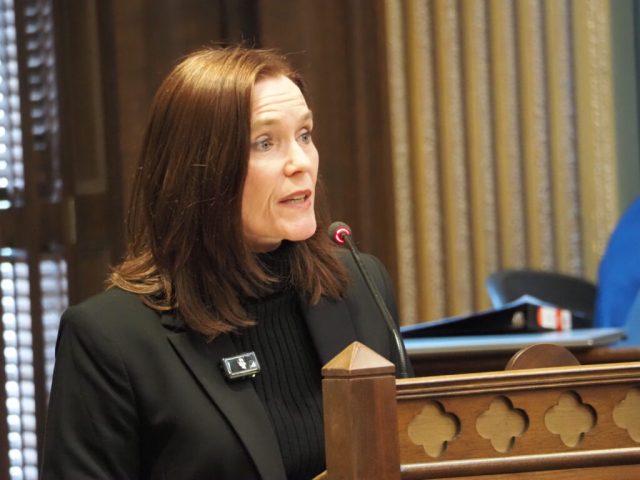
On Jan. 22, 2025, Senate Majority Leader Winnie Brinks (D-Grand Rapids) calls for support on a resolution allowing her to take legal action to compel the Michigan House of Representatives to send nine bills passed during the previous Legislature to the governor. | Kyle Davidson
Senate Majority Leader Winnie Brinks (D-Grand Rapids) and the Michigan Senate have laid out their arguments to the Michigan Court of Claims calling on Michigan House Speaker Matt Hall (R-Richland Twp.) to present nine bills passed during the end of the previous legislative session to the Governor.
For reasons still unclear, outgoing Democratic leadership in the House failed to submit nine bills to Democratic Gov. Gretchen Whitmer, which cleared the Senate during a record setting, 29 hour marathon session. Republicans took control of the chamber on Jan.1, with Hall later telling reporters he had an attorney conducting a legal review to determine whether they must present the bills and what the required timeline is for them to do so.
The bills held in limbo include policy intended to bring additional funding to museums owned by the city of Detroit, changes to the state’s wage garnishment and bankruptcy laws, an increase to the amount public employers must pay towards its employees’ health insurance and policies and extending eligibility for the State Police Retirement System to individuals in jobs related to law enforcement, including corrections officers and conservation officers.
“Every day that Speaker Hall holds these bills up is another day that our firefighters and teachers are footing the bills for massive spikes in their health care costs. It’s another day where corrections officers can’t access a fair retirement plan. These people and the jobs they do are essential to our communities and it’s shameful to be playing politics with their livelihoods,” Brinks said in a statement Tuesday.
Last week, Brinks filed suit against Hall, alongside House Clerk Scott Starr and the Michigan House of Representatives, arguing Hall’s refusal to present the bills left her no choice but to take legal action.
Brinks and the Michigan State Senate also filed a motion for summary disposition, asking the court to rule in their favor based on the facts of the case alone. Hall and the House have since responded, arguing the Senate’s request lacks merit, its motion should be denied and that the case should be dismissed.
In their reply, attorneys for the House wrote “The Senate’s claim that the current ‘House’ has a ‘constitutional duty to present these bills to the Governor’ is wrong because: (1) the business of the 102nd Legislature does not continue into the 103rd; (2) a past Legislature cannot bind future legislatures; and (3) Michigan’s Constitution imposes no duty to present legislation upon any specified legislative body or officer.”
They further argued that the Legislature is not a continuous body, and that any duty to present the bills ended with the previous legislature.
However, attorneys for Brinks and the Senate have countered, arguing that the duty to present is a duty of the entire Legislature, emphasizing language in the constitution which states “Every bill passed by the Legislature shall be presented to the Governor.”
They further argued that the language of the constitution includes no exception to the duty of presentation, meaning that duty does not end when one Legislative session ends and another begins, nor does the text allow for any delay. Additionally, the Senate’s attorneys note that House Rules recognize presentation as a ministerial duty.
Attorneys for Hall and the House also argued that the Speaker is immune from civil process during sessions of the Legislature under the Michigan constitution’s speech or debate clause, and that he had not been properly served.
However, the Senate response accused Hall of deliberately avoiding service, pointing to a quote from a Thursday press briefing where Hall said “We’re doing the press conference in [my private office] today just because, you
know, they can’t serve me in here. You know, and you saw we had the security outside because they want to break the law and break the Constitution. . . . So, you know, they can’t serve me in here because it’s my office. I mean, I guess they could barge in here. You want to lock the doors? . . . We’re on the run. . . . You know?”
The speech and debate clause also does not apply to non-legislative claims, they argued, meaning Hall is not immune.
“Based upon his actual knowledge of the case’s pendency, his evasive conduct, and the law, Speaker Hall was properly served when Plaintiffs served physical copies of the pleadings on Speaker Hall’s State Capitol office with his receptionist,” the Senate’s response reads.
GET THE MORNING HEADLINES.
